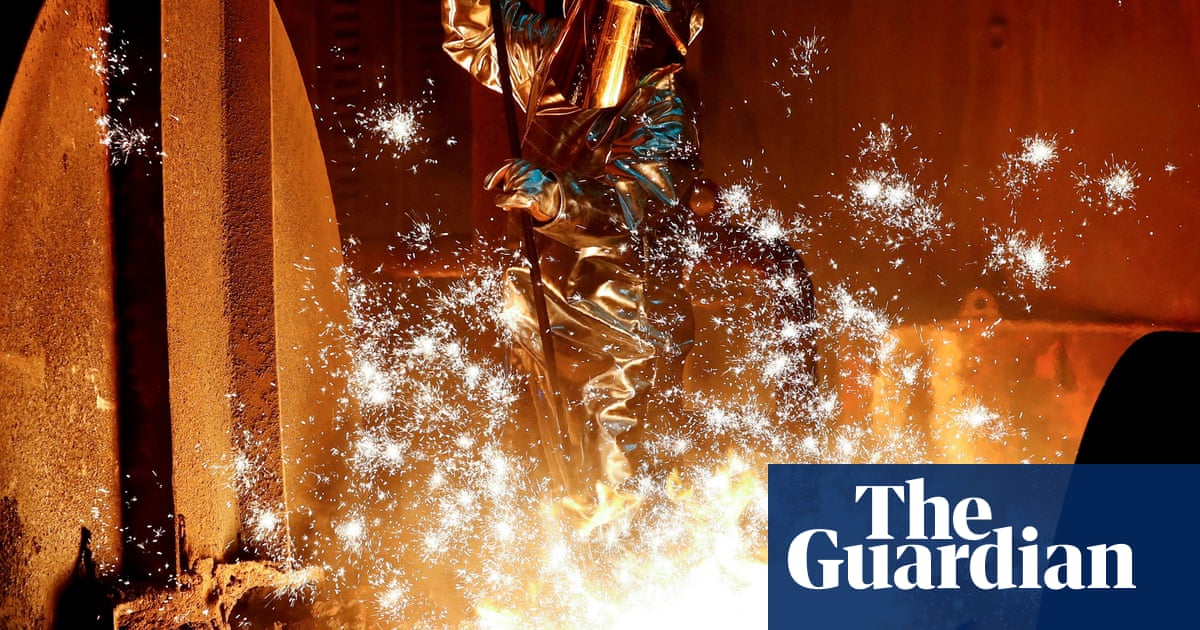Europe’s steel industry faces being “wiped out” in the face of Donald Trump’s prohibitive 50% tariffs, high energy costs and a mountain of cheaper Chinese steel, one of Germany’s biggest industrial groups has warned.
Ilse Henne, a board member at the steel, engineering and chemicals group ThyssenKrupp, said the industry faced an existential crisis after the US president’s decision last week todouble tariffson steel and aluminium imports from 25% to 50%.
Asked at the European Policy Centre conference on security in Brussels if she “feared a wipeout”, she replied: “Of course.”
Henne, who is chief executive of ThyssenKrupp Materials Services, told the Guardian: “Steel is at the beginning of the value chain, so you create a lot of instability for all these supply chains that get disrupted that now all of a sudden have to deal with much more expensive steel.”
Steel and aluminium are foundational industries, central to everything from submarines, aircraft and cars to everyday products such as stainless steel cutlery, food mixers and joists in housing.
“If the European steel industry disappears, we will have a lot of collateral damage,” said Henne. “A weak European steel industry is not only a weak European steel industry. It also puts all the other steps in the industry and the value chain in danger.”
She said Europe must step in to save the sector because it was fundamental for military security and was a large employer, and if it failed, the continent would be left reliant on the US and China for a key manufacturing material.
There is also the growing problem of cheap Chinese steel imports, something the European Commission has in its sights in current talks with Beijing over its dumping of goods in the EU, which are also covering the oversupply of cars andfast fashion. Chinese steel imports soared by 36% in the first quarter of 2025, according to Eurostat.
According to Henne, Russian steel is still appearing on the market, at a level of 3m-4m tonnes a year, just short of the 3.8m tonnes the EU as a whole exports to the US.
The US doubling of the tariff on steel and aluminum importsdoes not apply to the UK, which will continue to pay 25% until 9 July and is racing to implement the terms of a bilateral dealstruck last monththat would take the rate down to zero.
Ministers are working to ensure the UK’s biggest player in the sector, Tata Steel,is not excluded from the dealbecause it has begun importing semi-finished products from India and Europe since closing its blast furnace in south Wales last year. This could breach US rules that require all steel to be “melted and poured” in the country from which it is imported.
US representatives also have concerns that British Steel, which is owned by China’s Jingye group, could be used as a “back door” to bring in Chinese products. The UK government used emergency legislation totake control of the company’s plant in Scunthorpe, and according to the Sunday Times, ministers now face a standoff with Jingye over a £1bn-plus compensation claim to get it to relinquish its interest.
Sign up toBusiness Today
Get set for the working day – we'll point you to all the business news and analysis you need every morning
after newsletter promotion
Henne said Trump’s tariffs strategy could backfire and kill US heavy industries rather than deliver the revival he has promised.
“Following the 50% tariff increase, all US steel producers have immediately bumped up their prices. So the cost of manufacturing has gone up,” she said.
The impact “is a lesson that the US has to learn, unfortunately, I believe, the hard way,” she said. “What they are doing is actually limiting their own growth potential.”
In its second quarter outlook report issued last Thursday, Eurofer, the EU steel trade association, said the US tariffs had dealt “a severe blow” to recovery expectations. It has called on the EU to bring in “emergency” measures to help save the industry.
“There is a lot that we can do to save the steel industry,” said Henne, calling on the European Commission to do more to ensure hydrogen came on stream at a competitive price to reduce the reliance on oil- and gas-fuelled furnaces.
“Reducing the tariffs would be a good thing, but equally important for us is competitive energy pricing,” she said.
